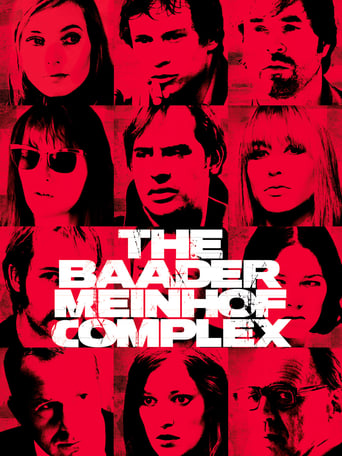Los hijos de la generación nazi prometen que el fascismo nunca gobernará el mundo otra vez.
"Der Baader Meinhof Komplex," released in 2008 and produced by G.T. Film Production and Nouvelles Éditions de Films (NEF), is a gripping cinematic portrayal of the notorious German left-wing terrorist group, the Red Army Faction (RAF). Directed by Uli Edel, the film delves into the turbulent period of the late 1960s and 1970s in West Germany, capturing the radicalization of a generation disillusioned by societal injustices and the Vietnam War. The narrative follows the group's founders, Andreas Baader, Ulrike Meinhof, and Gudrun Ensslin, as they escalate from protest to violent acts, challenging the state and sparking a nationwide manhunt. Set against the backdrop of the Cold War, the film meticulously reconstructs key events, including the liberation of Baader from prison, the group's audacious bank robberies, and their eventual capture. The production's attention to historical detail is evident in its use of authentic locations and period-specific props, which lend a raw authenticity to the storytelling. The performances, particularly by Martina Gedeck as Ulrike Meinhof and Moritz Bleibtreu as Andreas Baader, are compelling, offering nuanced insights into the psychological and ideological motivations driving the characters. The collaboration between G.T. Film Production and Nouvelles Éditions de Films (NEF) allowed for a multinational approach to the film's production, with scenes shot in the Czech Republic and France enhancing the film's international appeal. This partnership facilitated a broader perspective on the RAF's impact, not only within Germany but across Europe, as the group's actions reverberated beyond national borders. The film's release sparked renewed debate about the era's political climate and the ethics of terrorism, reflecting on how historical grievances continue to influence contemporary discourse. "Der Baader Meinhof Komplex" stands as a testament to the power of cinema to explore complex historical narratives. By presenting a balanced view of the RAF's actions and the state's response, the film invites viewers to reflect on the thin line between activism and terrorism, and the consequences of political extremism. Its detailed portrayal of a pivotal moment in German history serves as a reminder of the enduring relevance of understanding our past to navigate the challenges of the present.
Año2008
Página principal
Presupuesto19700000$
Duración149 minuto
Ingresos26937355$
GénerosAcciónCrimenDramaHistoriaSuspense
Países de producciónCzech RepublicFranceGermany





